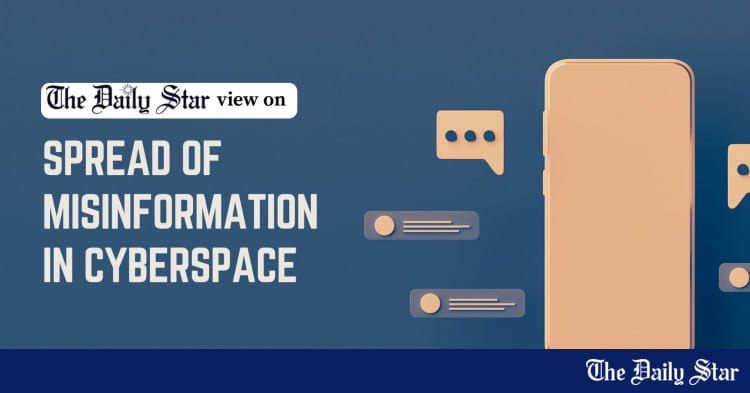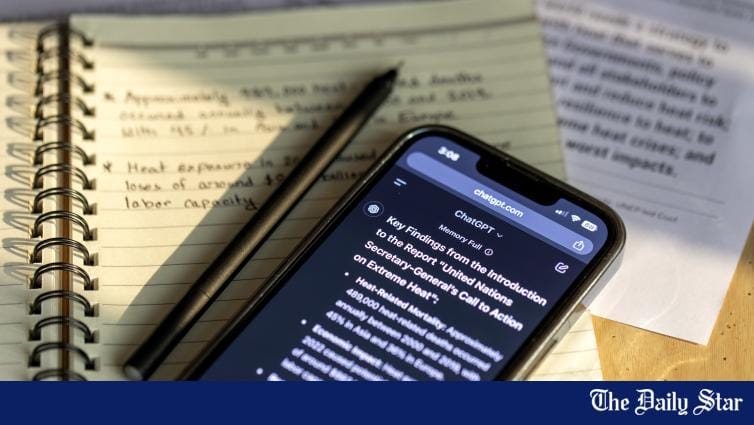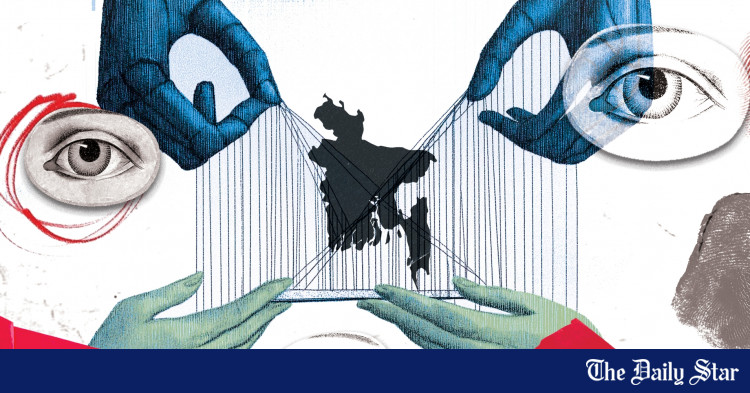Saif
Senior Member
- Joined
- Jan 24, 2024
- Messages
- 16,790
- Likes
- 8,152
- Nation

- Residence

- Axis Group


Address the misuse of social media and AI
AI and social media fuelling mis- and disinformation is threatening unity in Bangladesh.
Address the misuse of social media and AI
We must not let lies on cyberspace disrupt peace and unity

VISUAL: STAR
The United Nations chief's recent comment about social media and artificial intelligence (AI) amplifying hate speech and spreading disinformation rings true in Bangladesh's present context. Only five months ago, social media networks were used to unite people in bringing down Sheikh Hasina's fascist regime. Unfortunately, the same tool, enhanced with AI-generated content, is now being used to create divisions in society.
After the ouster of Sheikh Hasina's fascist regime, many perceive—60 percent, according to a recent survey by Voice of America—that freedom of speech and expression has improved in Bangladesh. Yet, as the lines between expressing an opinion and stating a fact become blurry and murky on social media platforms, people and organisations are being harassed or threatened with mob justice. More concerningly, thanks to social media, the propagation of misinformation and disinformation—as well as taking content out of context and presenting it with ill intention—is quickly spreading across national borders.
It has reached a new level, especially after the fall of Sheikh Hasina. For instance, our neighbouring country's media—given the political ideology they serve—are resorting to social media misinformation to such an extent that their actions are causing a rift in Bangladesh-India relations. More worryingly, it is instilling hatred among many people, threatening social cohesion and unity. Sadly, reiteration of falsehoods, sometimes with the help of AI-generated content on social media, often succeeds in gaining people's trust. In fact, a 2018 study by MIT's Media Lab found that "falsehood diffuses significantly farther, faster, deeper, and more broadly than the truth." Moreover, it is humans who reshare false information more than bots that are made for that purpose.
To counter the spread of misinformation and disinformation on social media, the government must develop ways to address the deepfakes of the cyber world. Countering false narratives and controlling the propagation of disinformation by forces outside the nation may require well-thought-out strategies. The country's media, as well as internationally reputed outlets, can play a role in this fight. At the same time, the government must ensure that press freedom in the country is not threatened. Additionally, the government's messaging in this context should be uniform, and its actions must reflect its words.
Additionally, the authorities should focus on improving social media literacy. Enhancing online intelligence capabilities should also be considered. However, any steps, including creating new policies to control and prevent cybercrimes using information as a weapon, should not come at the cost of people's right to privacy and free speech.
We must not let lies on cyberspace disrupt peace and unity
VISUAL: STAR
The United Nations chief's recent comment about social media and artificial intelligence (AI) amplifying hate speech and spreading disinformation rings true in Bangladesh's present context. Only five months ago, social media networks were used to unite people in bringing down Sheikh Hasina's fascist regime. Unfortunately, the same tool, enhanced with AI-generated content, is now being used to create divisions in society.
After the ouster of Sheikh Hasina's fascist regime, many perceive—60 percent, according to a recent survey by Voice of America—that freedom of speech and expression has improved in Bangladesh. Yet, as the lines between expressing an opinion and stating a fact become blurry and murky on social media platforms, people and organisations are being harassed or threatened with mob justice. More concerningly, thanks to social media, the propagation of misinformation and disinformation—as well as taking content out of context and presenting it with ill intention—is quickly spreading across national borders.
It has reached a new level, especially after the fall of Sheikh Hasina. For instance, our neighbouring country's media—given the political ideology they serve—are resorting to social media misinformation to such an extent that their actions are causing a rift in Bangladesh-India relations. More worryingly, it is instilling hatred among many people, threatening social cohesion and unity. Sadly, reiteration of falsehoods, sometimes with the help of AI-generated content on social media, often succeeds in gaining people's trust. In fact, a 2018 study by MIT's Media Lab found that "falsehood diffuses significantly farther, faster, deeper, and more broadly than the truth." Moreover, it is humans who reshare false information more than bots that are made for that purpose.
To counter the spread of misinformation and disinformation on social media, the government must develop ways to address the deepfakes of the cyber world. Countering false narratives and controlling the propagation of disinformation by forces outside the nation may require well-thought-out strategies. The country's media, as well as internationally reputed outlets, can play a role in this fight. At the same time, the government must ensure that press freedom in the country is not threatened. Additionally, the government's messaging in this context should be uniform, and its actions must reflect its words.
Additionally, the authorities should focus on improving social media literacy. Enhancing online intelligence capabilities should also be considered. However, any steps, including creating new policies to control and prevent cybercrimes using information as a weapon, should not come at the cost of people's right to privacy and free speech.





